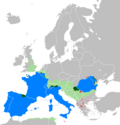Hieronymus Wolf (13 August 1516 – 8 October 1580) was a sixteenth-century German historian and humanist, most famous for introducing a system of Roman...
8 KB (982 words) - 13:03, 23 September 2024
bishop Hieronymus Vietor (c. 1480–1546/47), printer in Vienna and Kraków Hieronymus Wierix, Flemish engraver Hieronymus Wolf, German historian Hieronymus Georg...
6 KB (542 words) - 08:12, 28 October 2024
Empire, a term never used by the Empire, invented by German historian Hieronymus Wolf. His more immediate political legacy was that he replaced Diocletian's...
176 KB (20,488 words) - 02:13, 8 January 2025
The Boy Who Cried Wolf is one of Aesop's Fables, numbered 210 in the Perry Index. From it is derived the English idiom "to cry wolf", defined as "to give...
6 KB (732 words) - 00:22, 25 August 2024
Baron Munchausen (redirect from Karl Friedrich Hieronymus von Munchhausen)
Travels and Campaigns in Russia. The character is loosely based on baron Hieronymus Karl Friedrich Freiherr von Münchhausen. Born in Bodenwerder, Hanover...
73 KB (7,647 words) - 18:34, 28 December 2024
Roman state as a whole, Byzantium was introduced by the historian Hieronymus Wolf only in 1555, a century after the last remnants of the empire, whose...
23 KB (2,553 words) - 14:40, 27 December 2024
very faulty. This was followed by editions by Jakob Schegk (1554) and Hieronymus Wolf (1560). John Upton's edition published 1739–41 was an improvement on...
21 KB (2,675 words) - 21:01, 27 December 2024
for his 1557 revised version of Eucharius Rösslin's medicinal plant Hieronymus Wolf (1516-1580), historian and humanist, He coined the term Byzantium Heinrich...
9 KB (982 words) - 14:35, 14 December 2024
(New York: St. Martin's Minotaru, 2002). Imperii Graeci Historia, ed. Hieronymus Wolf, 1557, in Greek with parallel Latin translation. (PDF of 1593 reprint)...
5 KB (552 words) - 02:54, 19 December 2024
discipline's founder in Germany is considered to be the philologist Hieronymus Wolf (1516–1580), a Renaissance Humanist. He gave the name "Byzantine" to...
22 KB (2,404 words) - 20:38, 19 December 2024
about a century after the Fall of Constantinople, by German historian Hieronymus Wolf, who introduced a system of Byzantine historiography in his work Corpus...
77 KB (9,534 words) - 18:40, 21 December 2024
first applied to the Eastern Roman Empire by the German historian Hieronymus Wolf in 1557, later popularized by French scholars during the 18th century...
86 KB (11,513 words) - 14:21, 8 January 2025
not by the Latin West, which regarded it as Greek. After its fall, Hieronymus Wolf popularized the usage of "Byzantium". An informal cultural division...
33 KB (3,982 words) - 10:12, 9 January 2025
by Hieronymus Wolf. This claimed to be based on a heavily corrupted manuscript which required numerous conjectures by a scholarly friend of Wolf, who...
121 KB (14,806 words) - 01:36, 13 November 2024
20 – Jeronymo Osorio, Portuguese historian (born 1506) October 8 – Hieronymus Wolf, German historian (born 1516) November 3 – Jeronimo Zurita y Castro...
6 KB (520 words) - 21:25, 16 June 2024
property of the Counts of Oettingen in 1418. In 1530 the historian Hieronymus Wolf was a clerk at Harburg Castle. After the extinction of the protestant...
9 KB (1,059 words) - 08:40, 31 December 2023
and the eastern parts of the Roman Empire really were. The historian Hieronymus Wolf, after the Eastern Roman Empire had ceased to exist, was the first...
22 KB (2,209 words) - 23:01, 1 January 2025
until it first took its new meaning in 1557 when the German scholar Hieronymus Wolf published his Corpus Historiæ Byzantinæ, a collection of historical...
102 KB (12,216 words) - 05:29, 8 January 2025
Roman state as a whole, Byzantium was introduced by the historian Hieronymus Wolf only in 1555, a century after the empire, whose inhabitants called...
35 KB (3,917 words) - 09:44, 5 January 2025
the city governors. Rainer Stadelmann (1933 – 2019), Egyptologist Hieronymus Wolf (1516 — 1580), Historian & Humanist Wikimedia Commons has media related...
6 KB (713 words) - 05:43, 15 May 2023
Laonikos Chalkokondyles, whose works were widely propagated, notably by Hieronymus Wolf. "Byzantine" was used adjectivally alongside terms such as "Empire...
188 KB (20,693 words) - 04:28, 7 January 2025
term "Byzantine Greeks" is an exonym applied by later historians like Hieronymus Wolf; "Byzantine" citizens continued to call themselves Romaioi (Romans)...
90 KB (10,875 words) - 19:29, 22 October 2024
Medieval Greek language and literature as their objects of research. Hieronymus Wolf (1516–1580) is said to be the "father" of German Byzantism. In France...
57 KB (6,383 words) - 14:09, 20 October 2024
a century after the fall of Constantinople, when German historian Hieronymus Wolf published his work Corpus Historiæ Byzantinæ, a collection of Byzantine...
62 KB (6,924 words) - 10:19, 4 January 2025
5 – Matsudaira Shigeyoshi, Japanese general (b. 1493) October 8 – Hieronymus Wolf, German historian (b. 1516) October 26 – Anna of Austria, Queen of...
23 KB (2,797 words) - 18:22, 25 October 2024
Duke of Jülich-Cleves-Berg, German nobleman (d. 1592) August 13 – Hieronymus Wolf, German historian (d. 1580) September 2 – Francis I, Duke of Nevers...
30 KB (2,995 words) - 12:40, 3 January 2025
Duke of Jülich-Cleves-Berg, German nobleman (d. 1592) August 13 – Hieronymus Wolf, German historian (d. 1580) September 2 – Francis I, Duke of Nevers...
446 bytes (22,005 words) - 17:49, 20 September 2024
(New York, 1976). ISBN 0-231-04080-6 Imperii Graeci Historia, ed. Hieronymus Wolf, 1557, in Greek with parallel Latin translation. (PDF of 1593 reprint)...
9 KB (962 words) - 03:24, 22 October 2024
5 – Matsudaira Shigeyoshi, Japanese general (b. 1493) October 8 – Hieronymus Wolf, German historian (b. 1516) October 26 – Anna of Austria, Queen of...
429 bytes (22,820 words) - 21:37, 16 November 2023
Melanchthon and his circle in a partial edition of Lorenzo Bonincontri. Hieronymus Wolf, a philologist, passed through Wittenberg in the 1540s and was helped...
6 KB (690 words) - 08:42, 22 October 2023























